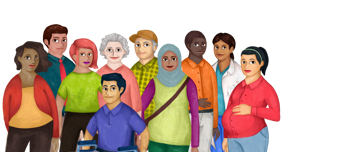WHAT:
The All of Us Research Program at the National Institutes of Health has made significant progress since its national launch three years ago, building and providing unprecedented access to a vast and diverse health research databank, reports Andrea H. Ramirez, M.D., M.S., All of Us senior advisor, and colleagues in the Journal of the American Medical Association (JAMA).
More than 386,000 adults have consented to be part of this landmark initiative with 278,000 adults completing all core initial steps of the program, including answering surveys, allowing access to electronic health records, and sharing biosamples. The program has placed high priority on engaging diverse populations. As a result, more than 80 percent of participants come from communities that have been historically underrepresented in biomedical research, making the All of Us dataset one of the largest and most diverse of its kind.
All of Us aims to advance individualized health care by enrolling one million or more people in the United States who agree to share data and biosamples for a wide range of research studies. Ramirez and colleagues outline the achievements of the program since enrollment launched nationally in 2018.
At the start of the COVID-19 pandemic, the program solicited important information from participants through online surveys, assessing early case exposures while temporarily pausing in-person enrollment activities to protect participants and staff. The program has restarted these efforts and has expanded opportunities for participants to provide biosamples in different ways, through saliva kits by mail and partnerships with local laboratories and blood banks.
In November 2020, participants began receiving genetic information, including genetic ancestry and traits. The program will offer information on hereditary disease risks and drug-gene interactions in the next year.
A publicly available website, ResearchAllofUs.org, offers overall data snapshots, accessible graphics and interactive tools designed to keep the public informed about the program’s progress. In addition, the program’s cloud-based Researcher Workbench provides registered researchers secure access to de-identified data for in-depth analysis. Since the Researcher Workbench was launched nearly a year ago, more than 770 researchers have gained access, and over 570 research projects have been launched.
“The All of Us Research Program is beginning to serve the research community with this initial release of data and tools, and its team looks forward to expanding access to diverse research communities and ultimately providing information that will contribute to better health for all people in the United States,” the authors write.
WHO:
All of Us Andrea H. Ramirez, M.D., senior advisor to All of Us Research Program Chief Executive Officer Joshua Denny, M.D., M.S., is available for interviews. Email: AllofUsPress@mail.nih.gov.
ARTICLE:
A Ramirez, et al. Progress with the All of Us Research Program. Opening Access for Researchers: Journal of the American Medical Association. (2021) DOI: 10.1001/jama.2021.7702
Contact:
All of Us Press Team
AllofUsPress@mail.nih.gov
301-827-6877
###
About the All of Us Research Program: The mission of the All of Us Research Program is to accelerate health research and medical breakthroughs, enabling individualized prevention, treatment, and care for all of us. The program will partner with one million or more people across the United States to build the most diverse biomedical data resource of its kind, to help researchers gain better insights into the biological, environmental, and behavioral factors that influence health. For more information, visit www.JoinAllofUs.org and www.allofus.nih.gov.
About the National Institutes of Health (NIH): NIH, the nation’s medical research agency, includes 27 Institutes and Centers and is a component of the U.S. Department of Health and Human Services. NIH is the primary federal agency conducting and supporting basic, clinical, and translational medical research, and is investigating the causes, treatments, and cures for both common and rare diseases. For more information about NIH and its programs, visit www.nih.gov.
